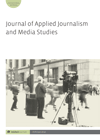
Full text loading...

 , Gaolefufa Joshua Madiba2
, Gaolefufa Joshua Madiba2 , Jane Banyana Pako-Bakane1
, Jane Banyana Pako-Bakane1
Drawing on the organizational culture theory, this article examines managerial decision-making at Botswana’s three press newsrooms, Botswana Daily News, Gazette and Mmegi newspapers, in response to the COVID-19 pandemic. Data collected through in-depth interviews with the journalists in Botswana identified three significant decisions made by management at the newsrooms: increasing the adoption and use of media technology, altering news production work processes and restructuring press newsrooms. WhatsApp was introduced as one of the leading social media platforms for distributing digital copies of newspapers. The findings demonstrated that lockdowns and the need to avoid physical contact established to reduce virus spread incited these decisions. Our data analysis underscored that not only has the COVID-19 pandemic interrupted the operating environments of newsrooms, but it has also pressured media managers to introduce innovative, progressive strategies to adapt to the new normal. Therefore, a public health crisis can influence organizational culture change in media organizations.

Article metrics loading...

Full text loading...
References

Publication Date:
https://doi.org/10.1386/ajms_00130_1 Published content will be available immediately after check-out or when it is released in case of a pre-order. Please make sure to be logged in to see all available purchase options.